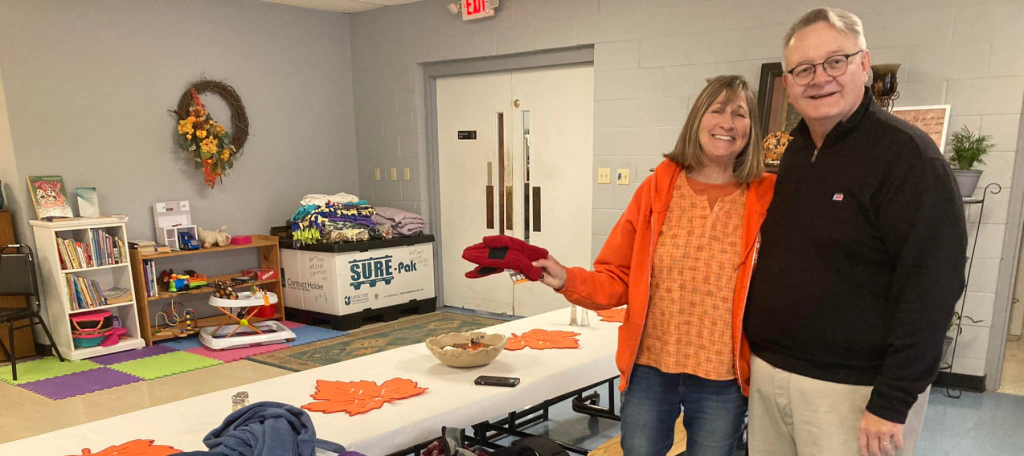“I’m the executive director for Harrison House of Hope in Harrison, Arkansas. We serve the unsheltered and unemployed community through breakfast and lunch on weekdays, and giving them places to do laundry and take showers. Our goal is to secure housing for our clients and help them find employment.
Harrison House of Hope was founded 12 years ago because of the need in our community. There were homeless individuals who could never develop stability in their lives. They might find a job but be on the street for eight weeks before they had enough money for a security deposit for housing. For the first seven years, all of our work was done with private funding. Limited money often restrained what we could do. We partnered with a federal grant that provides an ongoing cash flow for us to cover security deposits and rent for people.
Our goal is to become independent of federal funds and place more accountability and responsibility on the people we work with to develop life-work responsibility in their lives. We have an 82 percent retention rate (meaning people who are placed in homes stay in their homes), but the other 18 percent are revolving-door. They’re always looking for handouts and don’t develop life-work habits to secure their own stability.
We encourage clients to look into programs to get training and education. By challenging them and walking them through the process, they’re more likely to develop skill sets to help break dependency.
There’s a common thread: Once individuals get in the system of entitlement, they raise their family in that environment. They learn the way they can secure assistance for food, rent, and utilities, and it becomes generational. People who are raised in poverty often stay in poverty.
When I was young, my parents divorced. For four years, our resources were very limited. I would go out with my older siblings to collect coke bottles or anything we could sell. However much money we made is what we had to eat with that evening. It was tough but it taught me responsibility; to take initiative.
We didn’t have all those welfare programs at the time; if we had, we would have entered that same generational cycle. I didn’t want to stay in poverty, so I worked hard in school and in college to get a job. Too many individuals aren’t willing to make sacrifices today to get a reward later. Whatever family lifestyle people come out of, they think they need the same type of lifestyle.
For instance, in the homeless community, they have no income but they have the best iPhones around. They’ve learned the approach of getting free phones and services. If someone doesn’t intervene to show them that they’re people of value—and that being able to work helps fulfill that sense of value—then they stay in the cycle generationally.
A gentleman once came to us who had been homeless for five years. He was tired of living on the streets and begging. We began case management and taught him life skills, like the importance of brushing his teeth and bathing every day. He gravitated toward the fact that people cared about him and learned skill sets to help achieve stability. When he found a job and started making money, I talked about opportunities to get him into housing. But he told me, ‘If I do it myself, I’ll benefit so much more.’
Six weeks after that, he bounced into the office and told me, ‘Thank y’all so much for helping me. I’ve got a job, and today I signed a lease on an apartment in town. I’m moving in tomorrow.’ He was so excited he was able to do it with resources from his hard work. It was a total mind change. He could grasp his personal significance. It was remarkable to see.
I also once worked with a mom of three kids. She had experienced domestic violence, and we got her into a facility that helped with her mental health. We had someone from the local community college talk to her about her interests. We enrolled her in a nursing program to get a two-year associate’s degree. She got a part-time job while in school and finished her degree. Then she immediately got hired at a local hospital.
Afterward, she stopped by and told us, ‘I want to let you know I went to Social Security and turned in my [food stamp] card. I’m living completely on income. It feels so good to know I’m taking care of children and myself. And I’ve got the skill sets to do it. I would have never envisioned this possibility if y’all hadn’t helped me believe in myself.’
What I would say to policymakers is this: Don’t be intimidated to make work requirements part of the programs for individuals. It helps establish value.
When people come in on disability income and want assistance from us, we ask them to volunteer at least 10 hours per week in the community. They clean tables, sweep floors, clean the bathrooms, and file client folders. They’re given a sense of personal pride and tell their story to other people who walk in for the first time.
Engage these people in programs that can give value back to them. That will go a long way to break the cycle of dependency.”
William Tollett
Arkansan and Executive Director of Harrison House of Hope

